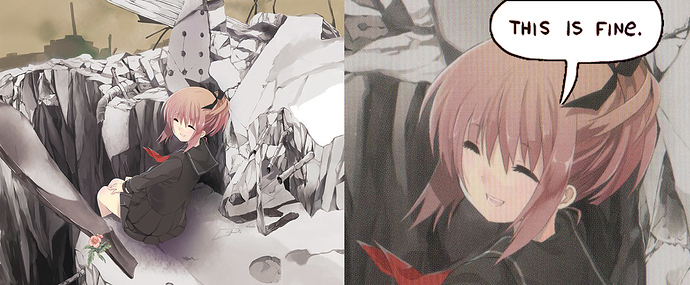This is gonna be my first post in the Love Song Bookclub. To be honest, I don’t dig the idea of commenting songs that aren’t tied to a film, series or game too much, mainly because I like either linking the music to the story or because I want to explain the story the music is explaining, but standalone songs or albums have stories that are very hard to grasp, let alone link to music, so sometimes I end up getting the feeling that music and story don’t match each other as they should.
Hence, I won’t comment on the story of the songs too much, but rather I’ll focus myself on the title, and music alone (although I’ll, of course, count the voice as another part of the instrument, I just won’t speak a lot about what the lines are saying). In fact, to keep my music critic as clean as possible, I decided to not look at the translated lyrics and to ignore whatever I could understand from the song. Later on, I’ll read them and comment them if I find something interesting enough.
終わりの世界から - Musical interpretation and analysis by a complete, but humble, music noob
Let’s begin then. The song starts off with a gentle version of the chorus, accompanied by a simple piano that underlines the melody that the voice follows while adding some arpeggios and octavated notes that give some more profundity and complete the frequency spectrum that one would expect from a fully instrumented song while maintaining the instrument count to two. The way this introduction feels is perfect: the voice appears to make a calm and unbiased statement that the rest of the song will build upon. However, the voice’s high ending note makes me think that while that statement is true, it holds a special meaning for the singer.
Then we have a nice transition that settles the main instrumental theme. Drums, piano, and guitar are the instruments that stand out the most right here, although there are some violins too, even though they can barely be heard, so they basically add some more tension to the melody played by the piano and guitar. I can’t find a true meaning for this part, so I just think of it as the introduction to the song and regard the previous part that I commented as the prolog.
Following this, we resume the singing and the instruments immediately relax to play a simplified version of the main theme, dominated by a very rhythmic drum, while the piano and guitar do some chords with a strange rhythm that combines strong times and weak times in measures, giving a peculiar rhythm-harmony as a result. After a couple verses, the guitar drops the strange rhythm and starts playing basic accompaniment chords and, at the same time, the violins get back in to increase the tension thanks to slight crescendo dynamics in almost every note and make it rise gradually with their characteristic timbre that feels unique when amidst pop-rock instruments and compositions.
Once a certain amount of tension has been achieved, the accompaniment radically changes to very basic accompaniment that lets the piano get all the protagonist with a high-pitched, high-volume broken chord accompaniment that, combined with the shift in the vocal melody, raises the tension even further up to its maximum so far, where the piano ceases to play (except for 4 slow notes) and the rest of the instruments half their tempo or even hold a chord for several measures, letting the voice maintain all that tension before it’s released in the chorus.
The chorus comes and causes a great effect on the listener thanks to all the buildup to this point. This chorus strong points are the high pitched endings of the singer, which seem as if she was crying for help, and the violin counterpoint to the singer’s melody. While the main accompaniment or instruments of this song are clearly the drums, guitar, and piano (this last one not so much during the chorus, though), the violins are fundamental to pull off this chorus. I’m impressed by this choice of instruments that Made made and how he used them, although we’ll see more about this later.
The second part of the chorus is quite similar, except that the new voice melody makes it look as if the singer was struggling and fighting for something, rather than crying for help. It’s also worth mentioning how this specific part of the chorus builds up, even more, tension to make up for what was “consumed” during the first part of the chorus. This way, there’ll be a tension peak when we reach the end of the chorus. Finally, the chorus ends with another high-pitched note, although this whole line sounds more calmed than the rest of the chorus. It might be a reflection of the singer looking back to the events happened in the chorus and the results of her effort.
What’s next? Time for another transition and another verse! In this verse, however, the violins start playing from the start. This could probably mean that the situation has become worse or that there is an urge building up as if something has to be done and the deadline keeps getting closer. However, since that’s the only change in the verse, it could be that this situation worsening or urge building up is something that the singer yet doesn’t know, as there’s no reaction from other instruments or the singer.
We then jump to another chorus with no noticeable change, although when it ends, we get to a differently structured verse where the drums become the main accompaniment that counterpoints the voice. It doesn’t last long and doesn’t have too much tension to it apart from it being unexpected. It’s a calm section after the second chorus that allows the listener to not be on full tension-resolve-tension-resolve dynamic for the entirety of the song. However, the last words of this verse have a sudden buildup that resolves into a guitar solo. What’s the meaning of the guitar solo? Well, I don’t think there’s much to it. I like to think of it as if events were happening in the background as if actions that the singer could not influence were taking place. However, musically speaking, both the calmed verse and the guitar solo are very important as they make a break in the song (especially considering that the calmed verse starts after 2’ 49’’ when there are 3’ 8’’ remaining, almost at half song). This break reduces the chances of the listener thinking that the song is repetitive and adds some more color to the general structure of the song).
After this relatively calm break, we come back to the main tension building verse: the one with the broken chord piano accompaniment. After having recovered the tension, it is resolved in the next chorus, although… Surprise surprise! There’s no big resolve and we get another calmed accompaniment version. But Maeda fools us again and we start getting more and more tension from the several instruments adding up to the accompaniment: at the start, just the violins in a very calmed way, then we hear some bass chords just before the drum remembers everyone the tempo with a very simplistic beat. When we got the tension up, everything gets shut down and the voice increases both pitch and dynamics. At the same time, the violin strikes a short-lasting, forte melody that stars the biggest resolve we’ve heard in this song so far.
Here we get our true deserved chorus in an extended version with full accompaniment, with some variations to drums, violin and especially “piano” (this might be strings played from a synthesizer? I don’t really know, it’s the fast climbing notes at 4’ 32’’).
Then we go back to the main instrumental theme, that immediately dies to allow another very calmed chorus accompanied by the piano. If the first one was the prolog, this one is the epilog. This time, the singer, that has been struggling a fucking ton during this last chorus has finally acknowledged all that has happened. She probably explains the conclusions of the actions she took in that chorus, but again, the high-pitched note that, despite being the tonic of the major scale this song is in, doesn’t feel conclusive enough. Thus, I think that this story has finished a chapter, but it isn’t over yet for the singer.
A piano’s calmed melody, with a certain importance to the events that have happened inspired by the octavated notes, brings this song to a conclusion.
At the very end, a crescendo noise (sorry, I can’t identify this instrument nor I like it too much as you can see) appears and links to the following song for reasons that I can’t grasp as off now. Anyway, this doesn’t belong to Owari no Sekai kara so I’ll talk about it in another post.
Now on to my personal impressions, although some of them must’ve definitely gotten filtered at some point during the previous review. This song has become one of my all time favorites, although experience tells me that this is only a feat if it remains with that status for a couple of months. I really loved the changes in pitch that the voice had and how, while every instrument played relatively simple melodies and accompaniments, their use, and combination of such musical voices were very complexly used, especially when we take into account that we are talking about a piano and violin, more or less classical instruments, combined with drums, guitar, and bass: typical jazz, pop, and rock instruments. They are instruments that, although it’s not the same time that they appear together in a song, their combination in this one is just right, with drums, guitar and bass taking the base of the accompaniment, the piano taking the more calmed sections and the counterpoint violin appearing to create tension or resolve it suddenly during the more hectic parts.
And not only this but details like the violins entering before in the second verse than in the first one or the differences in how all the chorus resolve and little variations that some instruments have at certain points are something that I appreciated a lot. Most of the times, when I hear this song, I feel myself listening particularly to a different instrument at each part, because they all get a moment in which they truly shine. It’s this instrument combination complexity what really made me like this song.
Anyway, this is it for now. I don’t think I’ll comment the lyrics as time’s short and I’d rather comment the other songs’ music in this album. By the way, apart from being short on time, and not digging too much the idea of commenting songs, the reason I hadn’t posted anything about the other album is because overall it didn’t appeal too much to me. I mean, there were some neat songs, but overall it didn’t cut it for me.
I appreciate all the feedback and, hey, you, yes you, music experts, I especially want you to spot whatever I’ve fucked up in my analysis because I don’t have a huge amount of knowledge and I might have said something wrong. Thanks in advance!




